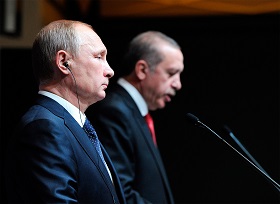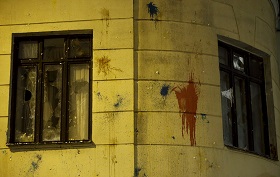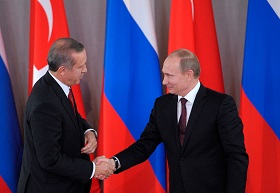Within hours, the downed Su-24 took Turkey–Russia relations, which had been cooling for some time, to a new low, thus marking a peak of tensions between Ankara and Moscow. There is more to what happened on November 24, 2015 than meets the eye. On the one hand, the military, diplomatic and inter-state tensions seem at first sight to involve two actors – Moscow and Ankara. On the other hand, it is clear that Turkey is perceived under these circumstances as a member of NATO and, in the opinion of many Russian politicians, part of the political games of the United States and not independent international player. President Putin’s description of the actions of the Turkish Air Force as “a stab in the back” is a statement that Russia has lost political trust in Turkey, which in the context of the Middle East crisis can be seen as a step back in the peace process.
In the context of what happened, it is necessary to explain the position of Ankara on several key issues:
First, like any sovereign state, Turkey has laws that must be respected by all countries, regardless of whether they are partners of the country or not. Thus, in June 2012, after a Turkish warplane was shot down by the Syrian Air Force, Ankara introduced so-called rules for responding to threats.
These rules involve exchanging information on the codification of aircraft that are close to the Turkish border and may in one way or another stray into the state’s airspace. At the same time, it has to be understood that the reaction of the Turkish Air Force to the aircraft of allies and non- NATO states may differ. From the time that the threat response rules were introduced, two planes and one helicopter of the Syrian Air Force have been shot down after crossing the Turkish air border. It is important to understand that these rules of response do not apply to Russian warplanes exclusively, but to the planes of any country that enters Turkish territory from the Syrian side. It is worth noting that, ever since the Russian Air Force became actively involved in Syria, Ankara expressly warned Moscow of the rules. Moreover, on October 2, 2015 the General Staff of the Republic of Turkey informed the members of the world community that the rules of response to threats had not changed. The military authorities urged all states whose planes may violate Turkey’s air space to provide information for identification by Turkish radars to avoid mistaken actions.
However, in early October 2015, Russian warplanes violated Turkish air space several times, as a result of which contacts had to be established between the ministries of defence of the two countries to minimize response measures on both sides. On October 15, 2015 the ministries of defence officially announced that a dialogue between Moscow and Ankara on this issue had been initiated. However, unlike the October 2015 agreement between Russia and the United States on air traffic safety in Syria, Ankara and Moscow did not seal the agreements in written form. That is, there is no concrete document that could coordinate the actions of the parties. Obviously, there was no dialogue between Turkey and Russia on the key issue of their interaction. It would be fair to say that Ankara and Moscow are pursuing different aims in the region, just like the interests of Russia and the United States diverge on many key issues, including the problem of settlement in Syria. But it is obvious that the mechanisms of interaction between Ankara and Moscow had either not been finalized, or they malfunctioned at an early stage of their definition.
Indeed, modern technology makes it possible for the military establishments and heads of state to make direct contact if necessary and, of course, in case of unforeseen circumstances. However, this mechanism was not used. This is confirmed by the divergence of positions on the audio recordings warning the Russian pilots that they were approaching the Turkish border published by the Turkish media. On November 26, 2015, Director of the Information and Press Department of the Ministry of Foreign Affairs of the Russian Federation Maria Zakharova described the recording as fake.
In this context, the political elites of the two states must agree that the sovereignty of state borders and the existing rules of conduct in the air must be respected by each side, even though the Turkish policy in this area may be open to criticism.
Second, since early November 2015, Ankara has drawn attention to the fact that Russian aircraft had intensified its strikes at positions in northern Latakia, where settlements of the Turkmen people, who are culturally and linguistically close to Turkey, are located. In the context of the ongoing conflict in Syria, it is extremely important to understand the interests of each side. In this case, Moscow justifies the increased bombings by the fact that terrorist forces had accumulated in northern Latakia – terrorist forces that obviously threaten the Russian naval base located dozens of kilometres from the conflict zone. At the same time, after the United States went into Iraq in 2003, the rights of the Turkmen people have been substantially curtailed. Turkey remained the only country that in one way or another was supporting a kindred people, fearing a repeat of the Iraq scenario in Syria. This is why Ankara is very sensitive to all the issues connected with the Turkmen people and their role in the political life of the Middle East.
At the same time, in spite of the attitude towards Turkey’s actions in the region and the settlement of the Syrian conflict, it is important to understand that Russia and Turkey are pursuing their own political goals. This applies to the attitude towards the Turkmen people, whom Turkey considers moderate opposition and Russia considers insurgents. Thus, it is vital for all the parties to the conflict to come to a consensus as to who is a terrorist and who is not within the shortest space of time. What is more, we should not forget that under the recent Vienna Agreements of November 14, 2015, Jordan has assumed the role of mediator through the United Nations in resolving the issue. The January 1, 2016 deadline set in Vienna must be the final deadline for determining the status of the warring parties in Syria. This may defuse tensions and minimize the escalation of the conflict so as to prevent it from developing into an open clash between states.
Third, one of the main causes of concern for Ankara is the issue of Damascus preserving the territorial integrity of the state. In northern Syria, which directly borders Turkey, there is the possibility that a Kurdish entity controlled by the armed forces of the YPG (People’s Protection Units), an offshoot of the PKK (the Kurdistan Workers Party) that is considered a terrorist organization by Ankara, could emerge. Moscow does not regard them as such. Moreover, Russian political circles openly support them, offering to supply them with weapons. Ankara’s reaction to this is obvious and understandable. Turkey finds itself sidelined in determining the future border zone and the possible formation of a so-called “Free Kurdistan” because, in Ankara’s opinion, the issue is being decided between the forces involved in the Syrian conflict and states that have more political and economic weight than Turkey. If a Kurdish autonomous region is created in Syria, Ankara will see its direct contacts with the Arab world severed, which would have extremely dire consequences. Thus, the Turkish side sees the Russia’s bombing of the positions of the Turkmen people as an inevitable increase there of the role of Bashar Assad’s army on the one hand, and the YPG on the other. Turkey also opposes the artificial resettlement of peoples from one territory to another in order to create a Syrian Kurdistan as an autonomous entity.
Finally, it is necessary to act to prevent further escalation of the conflict. The actions of the United States in Afghanistan and Iraq have demonstrated that it is a mistake to rely solely on military actions to resolve such conflicts. Not only have the problems there not been solved, but it can be safely said that in addition to destroying the statehood of these countries, Washington and the coalition have failed in their quest to eradicate international terrorism, which continues to hold strong positions there.
On the strength of the above, the following priority steps should be taken to ease the tensions between Turkey and Russia:
First, “the logic of war”, which has long prevailed in the region, must be replaced with the “logic of peace”. Clearly, the only party that stands to gain from conflicts between the sides is Islamic State.
Second, although Russia has decided to stop military contacts between Moscow and Ankara, the political elites and interest groups must agree on restoring them to prevent future incidents in the air between the Turkish and Russian air forces.
Third, it is necessary to restore the NATO–Russia Council, which became defunct after Crimea became part of Russia. Today, it can safely be said that Turkey, as a NATO member, sees its air space as part of the Alliance’s air space. It is necessary to establish contacts between the militaries to be able to coordinate actions. Moreover, it is obvious that the power of a state manifests itself not only its possessing modern systems, weapons, etc., but also in its ability to establish channels for dialogue and manage crisis situations through diplomatic agencies and expert communities on both sides.
Fourth, historical memory, the personal interests of all the states involved in the conflict without exception must be set aside for the sake of achieving peace in such a critical region. The reaction of Russia to the shooting down of its Su-24 is understandable.
Fifth, the responsibility of the leaders of states should not be shifted onto their peoples. In this context, it is critically important to determine the role of the media, which on both sides is forming a negative image of Ankara and Moscow by stoking up public hostilities. There has to be an awareness that at moments when tensions between two states are at their peak, the role of civil society and public diplomacy steadily grows. The people of Turkey and Russia must not suffer because of the temporary difficulties between the countries and ill-thought-out statements by both sides.
Sixth, as the case of Russia and the West shows, economic sanctions bring no results and merely widen the gap between the conflicting sides, greatly delaying the settlement of issues. Therefore, the retaliatory measures announced by the Russian side in the economic field are likely to hit both countries without bringing the solution to key issues any nearer. It has to be noted that Germany, which was once the number one enemy of the Soviet Union, is now one of Russia’s priority partners, and economic and political relations are developing in spite of past conflicts.
In this context, it is worth recalling that when Ukraine imposed a food blockade of Crimea in October 2015, Turkey promptly sent ships with food for the people of the peninsula. Moreover, Turkey is the only NATO country which, in spite of Western pressure, did not impose sanctions against Moscow after Crimea became part of Russia.
Seventh, since economics plays the key role in the life of any state, relations between Turkey and Russia in this situation may embark on the path of a “forced partnership”. Ankara today depends on Moscow’s energy and hydrocarbon supplies, which to some extent shore up the Turkish economy. At the same time, Russia is interested in selling gas to Turkey and other countries via Turkish territory. Although the Turkish Stream project is under question and recent events have made its future even less certain, Russia¬–Turkey energy cooperation should not be stricken off the agenda. In this context, the fate of the Akkuyu Nuclear Power Plant being built by Russia is also under threat. Still, it is obvious that decisions of this kind must be considered very thoroughly, with the political elite of the state making the decision weighing all the “pros” and “cons”.
Both Ankara and Moscow are of course aware of the long-term consequences of their actions, which is why there is still hope that the parties will be able to sit down at the negotiating table and arrive at the necessary consensus.







